- Home
- Justin Bell
Zero Hour_Thrilling Post-Apocalyptic Survival Series Page 6
Zero Hour_Thrilling Post-Apocalyptic Survival Series Read online
Page 6
“I’m with you,” Maria said, nodding. Javier returned the nod, then bolted across the road, angling wide around the three dead bodies and Maria followed, even though she wasn’t entirely sure why.
***
It wasn’t his legs that slowed Jackson’s pace, it was the continuing bitter edge of thick smoke, deepening in the air and crawling down his throat, settling painfully in his lungs. Arlington was long in his rear view and the broad-shouldered towers marking the city of Boston rose up to greet him, dark against the dimly lit sky, shrouded sentinels lined with dark windows. He was still in somewhat unfamiliar territory but felt at least a bit more comfortable as he approached the border to the city proper.
Once he was within the concrete and steel behemoths, he’d be able to better navigate his way to his apartment. Even with the city still a short way ahead, he could see the faint orange throb of firelight reaching between the various towers and the horizon was cloaked in an inky haze of growing smoke. The faint whine of sirens was audible in what seemed like all directions, red and blue flickers of light arcing up the darkened surface of the tall buildings. It was something out of a movie sequence, a city on the verge of collapse, and even as he saw it with his own eyes Jackson was having a difficult time tying it to his actual reality.
His brain struggled to process the sights around him as he kept walking forward. Route 2A had led him to Route 28 which he’d followed along, sticking to the shoulder, though very little traffic passed him by, a fact that in and of itself was unusual. As the city drew near, the Museum of Science loomed large, covered with rust-colored brick on his right side, crossing the calm and almost serene surface of the Charles River. It was growing dark as he neared the city and as he drew closer to the population center, he saw scattered shapes and heaps in various places throughout his journey. He never looked or ventured too close, unsure that he wanted to know what he’d find there, especially if what those girls in Arlington had said was true. As he approached the glass and metal facade of downtown Boston, rising up around and behind the TD Garden stadium, disaster felt obscure. He could hear the noises and smell the smells, but he had not, as of yet, run directly into any damage or destruction. It was abstract, though two of his senses could confirm what his eyes would not quite believe.
Glass shattered to his right, very close and loud, the explosion of a solid pane of a plate window. It popped as something burst through, then scattered apart, sending shards dancing along the sidewalk, a vision he could picture in his head as he heard it happen from just up ahead. Keeping his eyes forward, he kept walking. This kind of thing was happening all over the city, of that he was certain, and the last thing he wanted to do was get in the middle of a group of looters looking for trouble. He strode past the corner, angling toward Boston Common, a site he could easily use as a compass to find his tiny, expensive apartment.
“Whatchoo lookin’ at?” a voice screamed from Jackson’s right, and purely by instinct, he turned toward it. Four men stood huddled over the wrecked front window, their covered feet standing among a wide fan tail of glass shards, spread and twinkling lightly in the scant street light. Though there was some light down here on the streets, there wasn’t a lot of it, and Jackson couldn’t get a clear view of any of the men huddled there, not when they were standing still and certainly not as they launched themselves forward after him.
“Get him! Must be a rich boy living down here!”
“Hey!” Jackson shouted, taking an uncertain step backwards, his backpack sliding slightly off his right shoulder. “I don’t want any trouble!”
He didn’t wait for them to come to their senses, he simply spun on his heels and took off, dashing down the paved walkway on the side of the road, his casual dress sneakers slapping on asphalt. He could hear them running behind him, a quartet of heavy feet chasing him down, and he tried to force away the sudden jagged pain in his legs, legs that had been walking nonstop for hours and were not prepared to break into a sudden sprint. He sent himself charging forward, hugging the row of buildings to his right before he lunged that way, down a narrow passage between buildings. As he bolted into the alley, his foot struck something and he lurched, stumbling forward, toppling, and rolling as he struck the dirt and trash covered ground. Whirling around as he clamored to his feet, his eyes caught on the rumpled form of what looked like a long pile of discarded laundry, but in the pale glow of a street light he could see the twisted mouth, vacant eyes and sickly pale skin of a face glaring at him from underneath a loose-fitting sweatshirt hood.
His stomach clenched as he threw himself to his feet, shambling backwards, eyes wide. The corpse lay there on its side and as his eyes locked on it, unable to peel away, he could see the thick, dried trickle of flaked crimson at its lips. Pursuing footfalls thudded along the sidewalk and he could see the approaching shadows of the men running after him. He pushed off the wall, turning and running again. As he ran deeper into the alley he could hear the muffled exclamations of his pursuers as they stumbled upon the dead body, though they sounded far less horrified than he had felt upon seeing it.
Up ahead, Jackson saw a single door on his left leading into some unknown store. Beyond the door the alley ran into another building, dead-ending on the back side of the large structure. Jackson lurched left, slamming his shoulder into the narrow door, a flimsy looking wooden slat construct with an already cracked window facing the darkened alley. He lunged again, slamming into it a second time, and it felt like it gave slightly, but not enough to work his way inside. Footsteps slapped on pavement and he could hear the men charging toward him.
He slid the backpack off his shoulder and folded it partially around his fist, then threw himself forward, pistoning his arm straight out. The combination of backpack and fist hit the already cracked window and exploded it inwards, the window swallowing his arm up to the shoulder. Muffled shouts came from the huddled shadows as they continued their approach, and he reached his arm down, unlatching the door knob from the inside. A shard of glass bit into his right bicep as he pulled back, and he ground his teeth fighting back a shout. Slipping the door open, he slid inside, moving quickly into the small shop.
It smelled faintly of incense, the narrow rear hallway opening into a wider back room, with a slim, wooden desk, a computer workstation, and scattered filing cabinets. There were a few posters on the wall, one looked to be of a Japanese temple, while another had some ornate oriental calligraphy, characters and etchings that Jackson didn’t recognize. Slamming out through twin doors into the store itself, his eyes locked on a display shelf to his left, two glass doors covering all manner of Asian keepsakes and souvenirs. At the top of the shelf was a decorative curved stand with a sheathed sword resting lightly on hooked mounts, and without thinking Jackson snatched it from its spot and moved into the center aisle of the small market, ducking low and moving quietly.
He could hear the scuffle and banging of the men behind him entering through the same door he did, scoffing at and mocking the decor of the back room, then barging out through the twin doors that separated the shop and the office area. As he moved, he took the sheathed sword and slid it into the main compartment of his backpack, pulling the zipper up tight and locking it in.
“We know you’re in here!” one of them shouted.
“We catch you—we’re gonna hurt you!”
His eyes swept left, then right, his heart ramming in his chest. The market was dark and silent except for the footsteps and as he kept himself low between aisles, he realized he had just about run out of places to go.
Chapter Three
Jackson kept low, moving for the front door of the shop, hearing the scraping of feet behind him closer than he expected. He jerked right, crept toward the cash register counter up front and ducked low, trying to hide from the men. He saw it mounted to the underside of the counter, and it took him by surprise at first, a modern and distinctly American sight in the midst of all the ancient Asian artifacts surrounding it. The model was Heckler & Koch,
a FABARM FP6 combat shotgun. Small in length, it was about twenty-six inches long and slid easily into a containment sleeve underneath the register counter. Jackson clasped his fingers around the contoured handle and slid it out, quickly locating a box of shells on a shelf underneath. The scuffling of feet on floor grew louder, and he could even hear the haggard breathing of the men as they navigated the aisles looking for their prey.
Jackson slid a shell from the box, thumbed it into the chamber and jerked back on the pump, loading the round into the weapon.
“What was that?” he heard one of the men mumble, his feet stopping, then scuffling as he turned toward the noise.
“I heard it, too,” said a second man.
“By the register,” a third voice uttered.
Jackson glared at the object in his arm, the dull sheen of gun metal, the layered contoured material of the pump action. It was lighter than he thought it might be. Lighter, but infinitely heavier all at once.
Footsteps scuttled across the floor, squeaking slightly as they shifted on the tile, heading toward the register. Jackson lowered his head and closed his eyes, moving the weapon in his hands, wrapping his fingers around the curved handle, his opposite hand resting on the formed pump.
“I’ve got him!” a voice shouted, and he swung his head up, glaring at the man, whose face was obscured in the low light of the Asian market. Jackson threw himself to his feet, swinging the weapon around, and he could see the shift in the man’s shadow, the frantic back pedal. He punched the trigger, the weapon exploding in his hand, a deafening slam of sound, the barrel leaping up, threatening to wrest itself from his grasp. The shot went high and wide, smacking into the wall above the man’s head, scattering buckshot and tearing away chunks of plaster, spraying them over his face.
“He’s got a gun!” the guy screamed, ducking, turning and stumbling away. Jackson jacked the pump, jettisoning the spent shell, then slid another one inside, ramming the pump backwards again. He shifted right and fired again, the weapon blasting fire and thick smoke, overwhelming the persistent stench already in the air. Boxes on a shelf blew apart in torn shreds of cardboard, throwing dried cereal up into the air. Loading another shell, he lunged forward, circling around the register counter, then dashing toward the front door. As he ran, he turned and lifted the weapon, firing again into the darkened market, not even sure if anyone was still in there or if they’d already run for their lives out the back door. He flipped the latch on the inside of the front door and threw it open, spilling out onto the street and breaking into a run, heading for his apartment.
***
If someone on the street had looked up toward the indigo sky, they might have seen what they thought was a fat, round bird swooping in low, blocking the view of the three-quarter moon. It moved laborious and slow, nose down, propellers whipping smoke and soot in a crusty, sprawling sphere of tiny debris. Broderick held his hand in front of his face and let the scattered dirt spatter off his arm and body, trying to shield the valuable surface of his goggles. This deep into the city it was difficult enough to see, the entire landscape various shades of dull gray smoke, and he didn’t need dirt blowing up and caking all over the transparent surface of his eyepieces. The sound of the rotors whumping in the air was a constant din of noise within the cargo cabin, an endless whump whump whump of metal beating air nearly drowning out the sirens and screaming vehicle engines below.
The sound dug deep into Broderick’s soul. An indelible part of his fragments of memory. A scientist first and soldier second, nonetheless Broderick Schmidt had served; he’d had to in order to be a part of Team Ten. He’d worked alongside the United States Army, developing combat tactics in some of the worst places on the planet. More than once, he’d dropped into those places in a helicopter just like this one. It had sounded the same, the dull and repetitive punch of rotors on wind. It had smelled the same, the foul, acrid stink of smoke and burnt ground, molten sheet metal, scorched flesh. Only then it wasn’t soot and dirt from a burning city slapping against his outstretched arm, it was the blown remnants of desert sand.
His whole life, Broderick had wanted to explore the human genome, tear apart the structure of the human cellular system, find out what makes it work, find ways to heal it and make it better. Instead, it was the air filled with loosely packed sand in a faraway land he’d seen firsthand, and where he’d found out what the human body really looks like with its structure torn apart. Only there was no healing it in that place. There was no making it better.
No matter how many times he rode shotgun in a helicopter he found himself standing by the opened cargo door, soaking in whatever possible air he could, the memories of that hot sand forever on the forefront of his thoughts.
“What’s the problem, Brody?” Sergeant Davis asked from his seat. “Every time we ride one of these birds you hang out by the open door, man.”
“Chill out, Dean,” barked Felding. “You know what he went through over there.”
“None of us got where we are without going through some nasty stuff,” Davis hissed.
“Look, Sergeant,” said Major Chaboth. “You can cut the macho, tough guy crap, okay? There isn’t a single one of us here impressed by it. Minimum IQ in this bird is 130 and that’s probably you. Yeah, we’ve all seen our share, we’ve all been in the middle of it, and we all deal with it differently. Put down the jockstrap and get your head on straight.”
“Aye, aye, Major,” Davis replied, nodding curtly.
Chaboth lifted herself from her seat and moved toward the cargo door, supporting herself on handles hanging from the roof.
“Look,” she started.
“Don’t worry about it, Major. I’ve been dealing with it for years.”
“I know.”
Broderick looked out into the city, a vision that might as well have been a third world, war torn nation. Fires littered the landscape as the helicopter rounded downtown Boston, veering clear of the remaining skyscrapers. From their angle they could see dozens of emergency vehicles down below, lights throbbing and sirens wailing. Broderick pictured the frantic rescues happening and wondered briefly what they could be doing to help. He also wondered if what they were there to do would help anyone at all. If what happened in Quincy was a result of a bioweapon contagion and it really had happened several hours ago as all reports indicated, help was far too late. Quarantine procedures would simply be a band aid on a severed limb. And if the contagion had somehow spread into downtown, then got caught up in the smoke and fire? Could whatever virus this was be resilient enough to be carried far on the wind? If so, they could be flying above a landscape of bloated corpses down below and never even know. The fire was too wild and the smoke too thick for them to really see much down on the streets beneath the helicopter, and judging by the increasing smattering of dirt and sediment peppering his rubberized suit, Broderick suspected it was quickly getting that way up in the air, too.
As if on cue, the speaker in the cargo area squawked with static and Butch’s voice belted out. “I gotta put her down,” he growled. “Visibility is going downhill fast.”
Chaboth looked over at Broderick. “You went to school in this neck of the woods, right? We set it down here, how much of a walk are we talking?”
Schmidt looked out the open window, his fingers clasping a handle by the opened door. “If we followed the roads, we’d be about eight miles outside Quincy at this point, I think,” he said. “By the time Butch sets us down, probably closer to four or five. If we hoof it, we can get there within an hour or two, possibly a bit more. It might be good to get some firsthand perspective on the situation on the ground outside of Quincy, anyway.”
“See if it’s too late for the quarantine?”
Broderick looked at her. “It’s too late for the quarantine. We both know that by now.”
Chaboth nodded her agreement, then turned and faced the front. “Butch, set her down! We’re going to walk from here!”
She saw the pilot’s head nod from the front
seat and felt the Blackhawk dip, beginning its cautious but swift descent toward the rabid streets of Boston below.
***
Colonel Reeves lowered his head, keeping his arms tightly crossed behind his back.
“How long?” he asked.
Communications officer Yolanda Hayes shook her head softly as she adjusted the comm channel on the console in front of her. “Ten minutes? Fifteen?”
“Total radio silence?”
Hayes nodded. “We lost contact with the Team Ten crew for the first time approximately twenty minutes ago, then were able to resume sporadic communications. However, we lost signal again shortly thereafter and have been unable to call them back on comms.”
“You’ve tried the emergency channels?”
“Affirmative.”
The colonel walked away from the communications console and crossed his arms, looking up at the bank of monitors angling out from the wall. Several different newscasts were showing feeds from different locations, including a darkened street just outside of Boston. The colonel plucked a remote from a shelf against the wall, located the correct input and thumbed the button, deactivating the mute, and the newscaster began speaking.
“There are still more questions than answers tonight in the aftermath of what can only be described as a wide scale catastrophic event in Boston, Massachusetts earlier today. Sporadic reports mention no less than four aircraft went down within the span of forty-five minutes, and rescue efforts have been stretched thin in an attempt to uncover precisely what has occurred. Meanwhile, reports continue to flood in from across the country about what scientists are calling an unknown cataclysmic anomaly…”
Colonel Reeves looked over at Hayes. “Anomaly? No mention of any sort of viral outbreak?”
“Is that a good thing, sir? Do we know for sure that’s what we’re dealing with?”

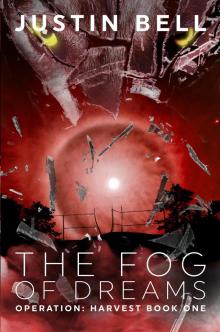 The Fog of Dreams
The Fog of Dreams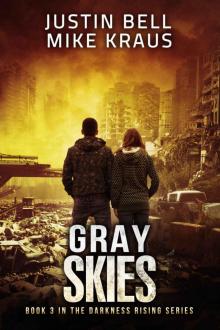 Gray Skies
Gray Skies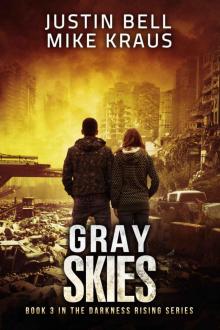 Gray Skies_the Thrilling Post-Apocalyptic Survival Series
Gray Skies_the Thrilling Post-Apocalyptic Survival Series Birth of Rebellion (War of the Three Planets Book 4)
Birth of Rebellion (War of the Three Planets Book 4)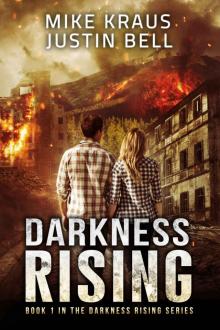 Darkness Rising
Darkness Rising Scorched Earth: Book 2 in the Thrilling Post-Apocalyptic Survival Series: (Zero Hour - Book 2)
Scorched Earth: Book 2 in the Thrilling Post-Apocalyptic Survival Series: (Zero Hour - Book 2)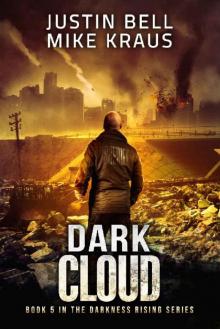 Dark Cloud: Book 5 in the Thrilling Post-Apocalyptic Survival Series: (Darkness Rising - Book 5)
Dark Cloud: Book 5 in the Thrilling Post-Apocalyptic Survival Series: (Darkness Rising - Book 5)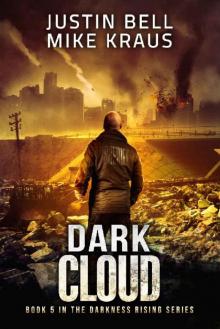 Dark Cloud_Thrilling Post-Apocalyptic Survival Series
Dark Cloud_Thrilling Post-Apocalyptic Survival Series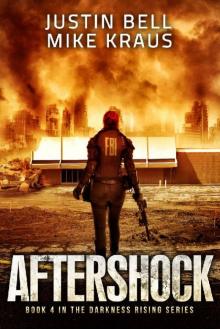 Aftershock: Book 4 in the Thrilling Post-Apocalyptic Survival Series: (Darkness Rising - Book 4)
Aftershock: Book 4 in the Thrilling Post-Apocalyptic Survival Series: (Darkness Rising - Book 4) Aftershock
Aftershock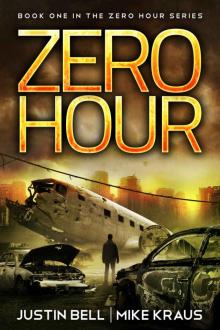 Zero Hour: Book 1 in the Thrilling Post-Apocalyptic Survival Series: (Zero Hour - Book 1)
Zero Hour: Book 1 in the Thrilling Post-Apocalyptic Survival Series: (Zero Hour - Book 1)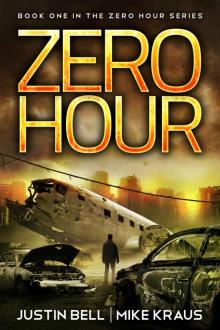 Zero Hour_Thrilling Post-Apocalyptic Survival Series
Zero Hour_Thrilling Post-Apocalyptic Survival Series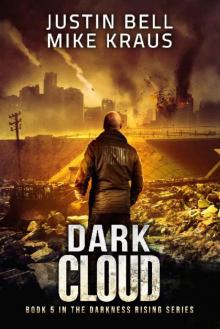 Dark Cloud
Dark Cloud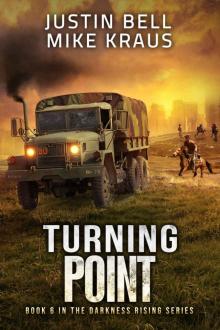 Turning Point: Book 6 in the Thrilling Post-Apocalyptic Survival Series: (Darkness Rising - Book 6)
Turning Point: Book 6 in the Thrilling Post-Apocalyptic Survival Series: (Darkness Rising - Book 6)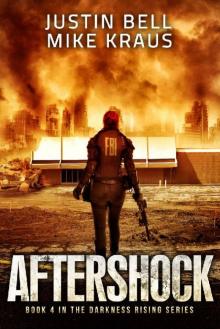 Aftershock_the Thrilling Post-Apocalyptic Survival Series
Aftershock_the Thrilling Post-Apocalyptic Survival Series War of the Three Planets Collection (Book 01)
War of the Three Planets Collection (Book 01) Stars on Fire
Stars on Fire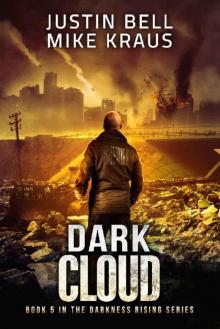 Dark Cloud_the Thrilling Post-Apocalyptic Survival Series
Dark Cloud_the Thrilling Post-Apocalyptic Survival Series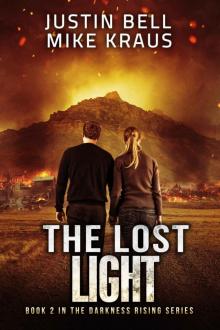 The Lost Light
The Lost Light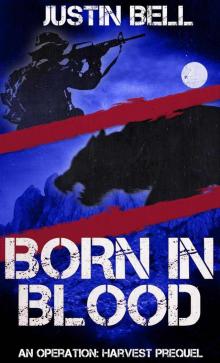 Born in Blood
Born in Blood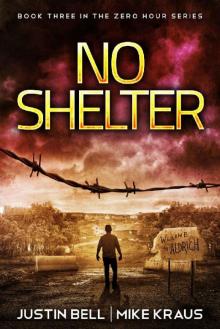 No Shelter: Book 3 in the Thrilling Post-Apocalyptic Survival Series: (Zero Hour - Book 3)
No Shelter: Book 3 in the Thrilling Post-Apocalyptic Survival Series: (Zero Hour - Book 3) Iridium Attacks
Iridium Attacks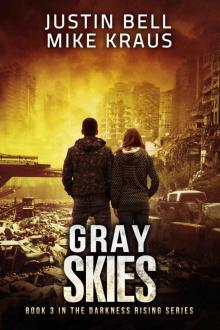 Gray Skies: Book 3 in the Thrilling Post-Apocalyptic Survival Series: (Darkness Rising - Book 3)
Gray Skies: Book 3 in the Thrilling Post-Apocalyptic Survival Series: (Darkness Rising - Book 3) It's Always Darkest
It's Always Darkest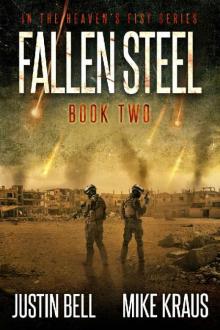 Fallen Steel: Book 2 in the Thrilling Post-Apocalyptic Survival Series: (Heaven's Fist - Book 2)
Fallen Steel: Book 2 in the Thrilling Post-Apocalyptic Survival Series: (Heaven's Fist - Book 2)